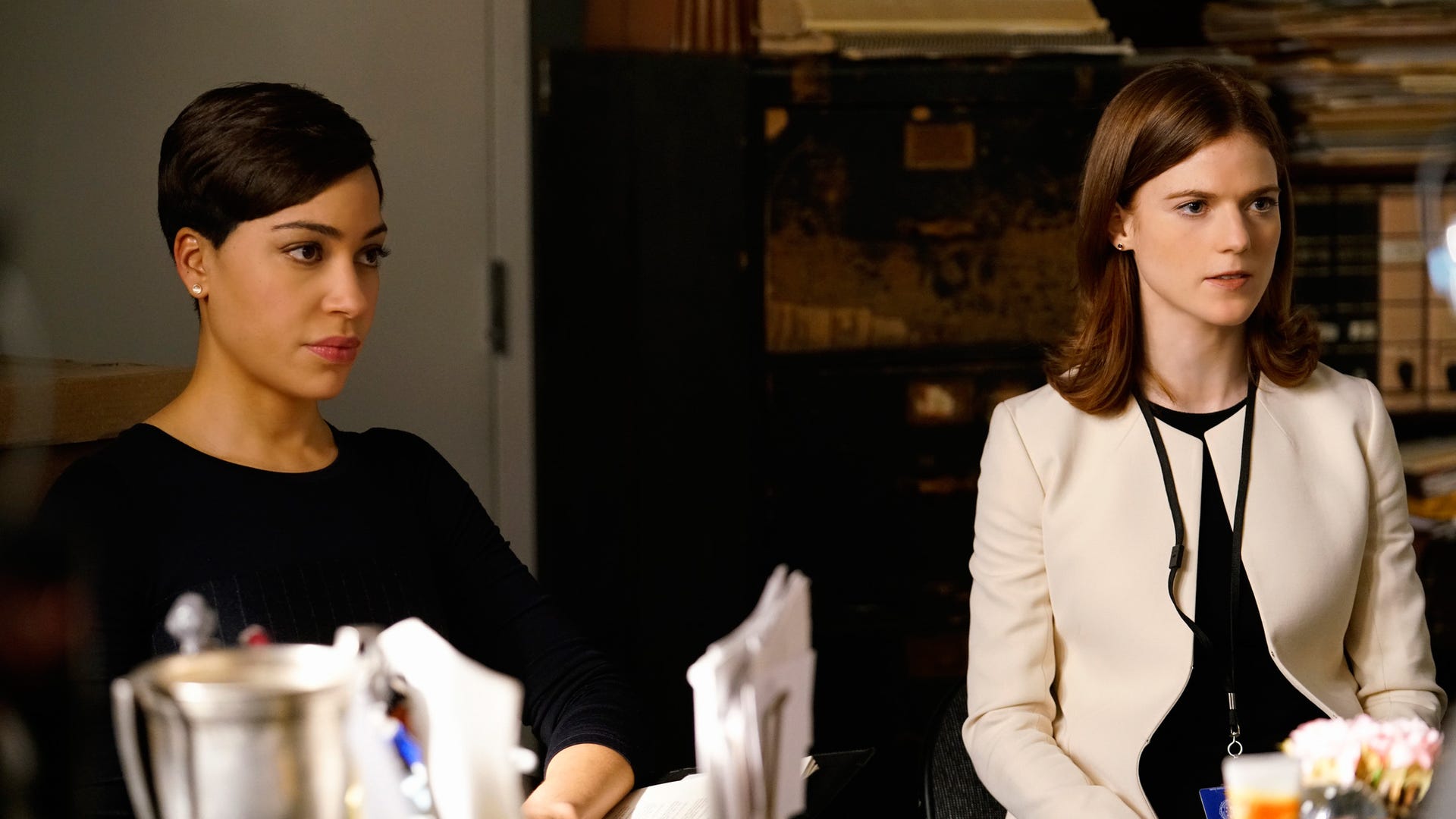Join or Sign In
Sign in to customize your TV listings
By joining TV Guide, you agree to our Terms of Use and acknowledge the data practices in our Privacy Policy.
The Good Fight: Maia Can't Trust Her Memories or Her Family
Maia's memory was the only thing keeping her from a jail cell
"Self Condemned" was the penultimate episode of The Good Fight's solid first season, and it decided to dig in pretty deep into the Rindell Fund scheme and what Maia (Rose Leslie) knew about it, if anything. That we're getting to this now, in the second-to-last episode of the season, highlighted how thin the Rindell storyline has been, and generally how poorly it has served Maia as a character.
The Rindell storyline has treaded water for most of the season. It was at its best when it was feeding other, more interesting storylines but when it wasn't doing that, it was mostly just lurking around, occasionally offering up tantalizing bits of information -- we have a list of names and accounts! -- that never ended up amounting to much. The lack of any real solid plot development just meant the Rindell scandal never got beyond being the catalyst for show's narrative.
Compounding this issue was the fact Maia similarly sort of drifted. As a first-year associate, she was never privy to a lot of the action that drove the rest of the show, leaving her to hang around Reddick, Boseman & Kolstad, waiting for someone to throw her a plot bone. That didn't happen until the Rindell case filtered into the firm and she had awkward recorded and non-recorded conversations with Henry (Paul Guilfoyle).
All of that being said, while "Self Condemned" was probably an instance of "too late," it wasn't an instance of "too little." With Lucca (Cush Jumbo) at her side, Maia answered questions from Madeline Starkey (Jane Lynch), an unassuming but decidedly crafty FBI agent wanting to streamline the details of the Rindell scandal and to find out if Maia knew anything about it. And through it, we were able to learn a bit more about Maia. The actual information wasn't necessarily new, but the emotions behind it were.

Cush Jumbo and Rose Leslie, The Good Fight
Patrick Harbron/CBS
To achieve that, "Self Condemned" brought back one of my favorite devices from The Good Wife: memory pops. If you didn't watch Wife, co-creator and producer Robert King used the term to describe those quick flashes of recollections that are peppered throughout this episode. Unlike more traditional flashbacks that tend to have an air of authority and clarity, memory pops are built on subjectivity and emotion, and that makes them elliptical and occasionally unreliable. They're much more like actual memories in that way than how flashbacks are typically presented.
The subjectivity of them is the big reason why I like memory pops, and it's why I'm glad the device resurfaced here. They grant us access to a character's headspace, and that's something we've sorely needed for Maia.
Throughout Starkey's questioning, Maia recalls bits and pieces of events from years ago (we'll put aside the iffy attempts to make Leslie, 30, look 17 with frizzy hair and too much rouge): doctor appointments, doing homework, opening doors, birthday parties, necking with Amy (Heléne Yorke) for the first time, and so on.
Did a young Maia ever see Lenore (Bernadette Peters) and Jax (Tom McGowan), or was that just an image present-day Maia placed there? Did Diane (Christine Baranski) really say suggest that Ruth Madoff knew and just pretended not to? Does it matter? (No.) As Lucca helpfully explained, Maia's feelings of guilt, created by angry glares, vicious and detailed rape threats, Diane's financial collapse, and her Catholicism, may have colored her memories to the point that she believed she needed to be punished.
To a certain degree, all of this explains Maia's behavior across the season, including her general lack of a presence. She's smart and perceptive, as Starkey noted, and we've seen that before, when the show gives her something to do. However, she's not a go-getter, or someone who advocates too much for herself. For her entire life, Maia was always on the edges of the action, listening, observing and avoiding conflict. Maia doesn't rock the boat because that boat, especially at a time in which she really forming into who she might become, was always in very choppy waters of hushed or heavy conversations.
It was a lot to take in, but it was so effortlessly delivered that it didn't seem like the show suddenly decided to provide strong emotional motivation for Maia's actions beyond her caring about her dad. Except that was largely the case.
It's possible to argue the season was about Maia arriving at this point, the point of admitting that she knew all along. That seems flimsy, however, to me, given that this sort of a dive into Maia's emotional state hadn't really been done before. The build-up to it was lacking since so much of the Rindell stuff was driven by a sense of immediacy and not by a sense of history. To give it a history all at once snapped Maia into focus just when the show needed it to happen to salvage its one big season-long story right before the finale.
The result was that this was good for the show in the long run, but that in terms of the season, I wished this had happened a bit sooner so I could've had time to develop some actual investment in the story instead of trying to muster up in at the very end.
The Good Fight streams new episodes on CBS All Access on Sundays.
(Full disclosure: TVGuide.com is owned by CBS.)